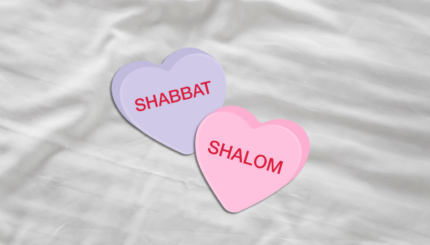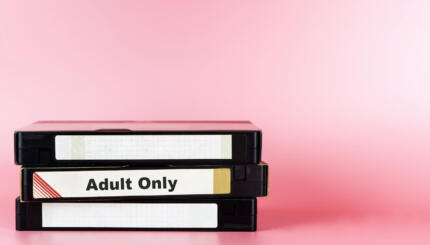A retired kosher butcher, his young lesbian writing teacher, and a letter from the heart: Lesléa Newman’s short story, “A Letter to Harvey Milk,” has moved readers for over two decades—and now it hits Broadway! With songs like “What A Shanda” (listen here – click on the “music” tab), the show debuts at the New York Musical Theatre Festival, July 23-28, with music by Laura Kramer, lyrics by Ellen Schwartz and book by Jerry James.
We caught up with Lesléa to get the back story about how her short story became such a universal symbol, how it became a stage sensation, and what’s next for both it and her.
Learn more about
Harvey Milk and Lesléa Newman, including behind the scenes photos, at lgbtjewishheroes.org.
It’s wonderful that a short story you published in 1988, as a letter to a public figure killed a decade before that, retains such resonance. What is it about Harvey Milk that still captures our imaginations and our hearts?
Harvey Milk was completely human. He was smart, kind, funny, honest, strong, vulnerable, and brave. He took many risks, and always did things with a sense of humor. He made himself very accessible – he was someone people felt they could sit down and talk with over a cup of coffee. Plus he was OUT at a time when there could be (and often were) grave consequences for that. I think many of us who didn’t know him personally still felt a sense of personal loss when he was taken from us in such a terrible way. With each new victory for the GLBT Civil Rights Movement (the recent ruling that DOMA is unconstitutional, President endorsing gay marriage, etc.) I often wonder, “What would Harvey Milk think of that?” Or, “What a shame that Harvey Milk didn’t live long enough to see that.” He lives on in our hearts and minds. He was a pioneer, and he deserves the status of hero.
At the same time that “A Letter to Harvey Milk” is fiercely Jewish, it emphasizes strongly how universal the man’s appeal was. In the musical, this is represented in lines like “You don’t have to be a Jew to love a bagel, or gay to love a leader who is gay.” How Jewish is the story of Harvey Milk? Versus how universal? What’s it like working with that tension?
“A Letter to Harvey Milk” was written out of the experience of being Jewish and gay, and it is about the human experience. Maya Angelou once said, “I speak to the black experience but I am always talking about the human experience.” I feel similarly about being a Jewish lesbian and writing about the human experience. If one’s characters are portrayed as fully human, anyone can relate to them, even when coming from a different background. Perhaps especially when coming from a different background.
“A Letter to Harvey Milk” went from fiction published in Lilith magazine to the titular short story in a collection, and now to musical on stage in New York City. What’s it like to shepherd a work through such changes? Does the message change with the medium at all? Does it reach a different audience?
The story was also performed as a one person show all over the world (including Israel and Germany), made into a short film by Yariv Kohn which was shown at many Jewish film festivals, read on the radio by Carl Reiner as part of a series produced by KCRW Santa Monica and hosted by Leonard Nimoy entitled “Jewish Stories: from the Old World to the New” and turned into a teleplay shown on Canadian Public TV which won a Gemini (the Canadian equivalent of an Emmy). I gave each project’s creative team full artistic freedom, and I am happy to say that all of them stayed very true to the original story, augmenting it with their vision and talent. The story has taken on a life of its own, and I am very grateful that it has reached such a wide audience because of that.
You’re quite famous as an author of children’s literature. What’s the relationship between writing work for kids and stories like “A Letter for Harvey Milk,” which is for an older audience?
As far as I’m concerned, writing is writing. I don’t sit down and say, “I’m going to write for kids today” or “I’m going to write for teens today” or “I’m going to write for adults today.” I just start moving the pen across the page (yes, I still write with a Bic pen and a spiral notebook!) and see what happens. Then once a project begins to take shape, I stick with that piece of work until it’s finished. As the writer Gene Fowler so famously said, I go back to “staring at a piece of paper until three drops of blood appear on my forehead.”
After this incredible journey, what’s next for “A Letter to Harvey Milk”? What’s next for how we in the queer Jewish community relate to his memory?
Next stop, Broadway! (from my mouth to G-d’s ears)
The show is really incredible, with 18 (note that auspicious number) funny, touching, sad, inspiring, and original songs, and I hope it gets the attention it deserves. And Harvey’s dream and vision lives on through the Harvey Milk Foundation. The Foundation, through Harvey’s dream for a just tomorrow, envisions governments that celebrate the rich and universally empowering diversity of humanity, where all individuals – gay, lesbian, bisexual, transgender, racial and ethnic minorities, the elderly, the young, the disabled – all who had been excluded can fully participate in all societal rights without exception.
And what’s next for Lesléa Newman?
On September 25, 2012 (erev Yom Kippur) my book, October Mourning: A Song for Matthew Shepard will be released by Candlewick Press. The book explores the impact of Matthew Shepard’s murder upon the world in a cycle of 68 poems that are fictitious monologues written from many points of view including the silent witnesses of the crime: the fence Matt was tied to, the moon that looked down upon him, the deer that kept him company all through the night. My hope is that the book will inspire readers to erase hate and replace it with understanding, compassion, and love.
kosher
Pronounced: KOH-sher, Origin: Hebrew, adhering to kashrut, the traditional Jewish dietary laws.


